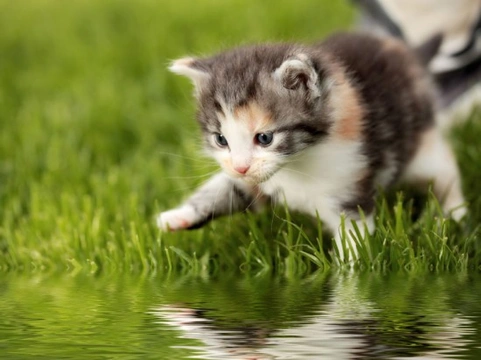
Introducing your new kitten to the outside world
You’ve had your new bundle of feline fun for a couple of weeks now, and he’s starting to show some interest in going out, peering longingly out of the window or trying to follow you out. So what should you do? There are a lot of factors to be taken into consideration when deciding whether to allow your kitten to go out:
- How safe is your garden - is it completely enclosed?
- Do you live on or near a busy road?
- Do any of your immediate neighbours have dogs likely to harm your kitten?
- Do you or your neighbours have a swimming pool or fishpond that a small kitten could fall into?
- Have any of your neighbours put rat poison down in their gardens? Or even slug pellets?
- Are there any poisonous plants in nearby gardens?
You will also need to take into consideration – is your kitten fully vaccinated? If you have bought a pedigree kitten, then he should have had his routine jabs before he comes to live with you, as he will probably be at least 14 weeks old. If you have acquired a non-pedigree kitten, he may not be old enough to have had his routine flu and enteritis injections as they are normally done at about 10 weeks and then 12 weeks, and your new kitten may not have been quite old enough when he came to live with you. Even if your kitten has had the basic vaccinations, it is also worth having him vaccinated against the Feline Leukaemia Virus (FeLV) if he is going out of doors, as this particular virus is transmitted through the saliva or urine of an affected cat, and there is a risk of unknown cats passing through your garden. It is also a good idea not to allow very young kittens out in the garden alone until you have had them neutered – spayed for a female and castrated for a male. Kittens can become sexually mature at a very young age, sometimes as young as four to five months old. You do not want a young female kitten becoming pregnant whilst she is still very small, or a male kitten starting to wander off in search of a mate. You can have your kittens neutered at around four to five months old depending on how big they are, but it would be worth seeking advice from your Vet. If you have decided that your kitten will be safe to venture into the garden, it’s a good idea to go out with him for the first few times to make sure that he is safe, and see if he is likely to put himself in danger from hazards in your garden that you had not previously considered. Maybe it would be a good opportunity to catch up with some gardening so that you can keep an eye on him. He may well be interested in climbing up any trees you have, and you will need to see that he can get down again safely by himself. You may also need to sort out any arguments between your kitten and any neighbours’ cats that have previously considered your garden to be part of their territory as cats are very territorial creatures and your new kitten will need to be capable of defending his corner all by himself.Once your kitten has established himself as the territory-holder in your garden, it is nevertheless still a good idea to bring him in as soon as it starts to get dark. You will still need to maintain a litter tray for him (maybe in a utility room, or a quiet corner of your hall) as you probably won’t want to be letting him in and out in the dark, especially when it is cold and wet outside. It has been shown that cats are far more likely to get involved in fights at night, and also more likely to wander then, putting them at risk from passing traffic (when they can become mesmerised by the headlights), and even any large wildlife such as foxes that may see a kitten as fair game. If your kitten won’t come in when you call him and it’s getting dark, the chances are that he’s hiding under a nearby bush watching your antics as you try to find him, but one method of calling him that doesn’t usually fail is the tried and tested trick of shaking or rattling a container of cat treats. As soon as Kitty appears, entice him indoors with a tasty morsel, but make sure you always reward him if you use this method, as he will soon learn that it’s not worth responding to if he does not get a treat! If you already have an older cat that comes and goes as he pleases using a cat-flap, it’s not quite so easy to keep your new kitten in if you feel it is unsafe for him to go out, as a kitten will soon learn how to use the flap by watching his older house-mate. In cases like this, you may need to restrict the activities of your older cat for a while, or maybe shut the door to the room where the cat flap is, and he will soon let you know he’s back home and you can then let him in to the rest of the house and perhaps shut the cat flap overnight. Or you may need to invest in a new cat flap that only allows access to cats wearing a particular coded tag round their necks. If you want to keep your kitten safe indoors, you will also need to make sure that windows are kept shut – kittens can be quite ingenious when planning the Great Escape!



